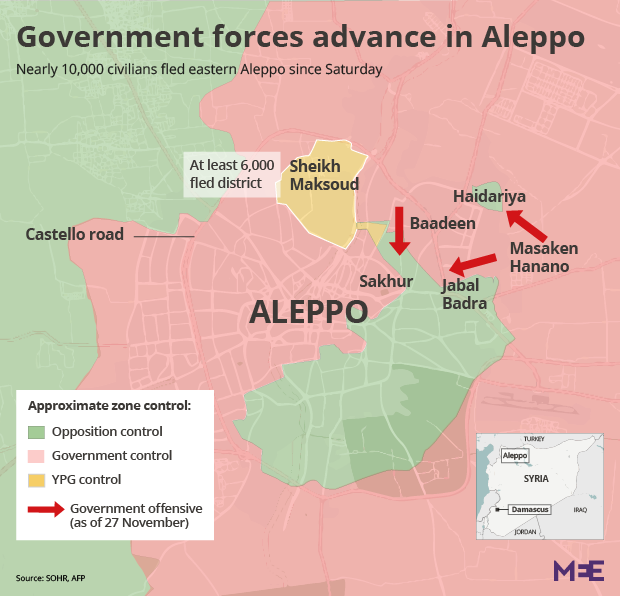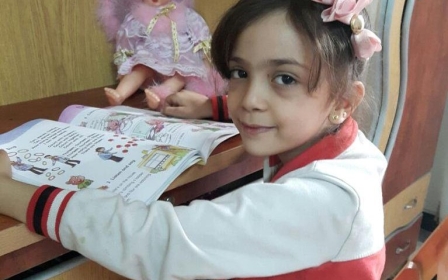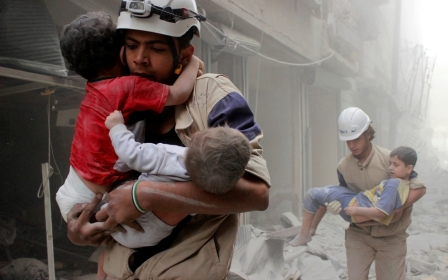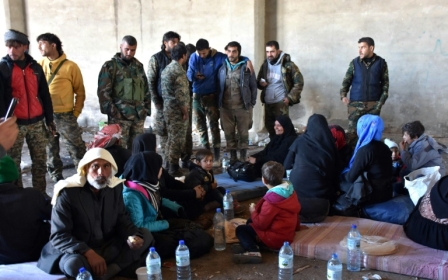Battle for Aleppo: Chaos in the streets as civilians flee army onslaught
Sakhur, Aleppo, SYRIA - The sound of bombs and gunfire is close and unrelenting as the refugees pick their way through the rubble littering the streets. Laden with suitcases, they arrive in the Sakhur district of Aleppo from areas to the north now engulfed in fighting, only to find yet more violence.
Others have already decided this district of eastern Aleppo is a place where they can no longer hide - amid the chaos on the streets, long-time residents are moving out as others move in, trying to beat the rapid advance of pro-government forces as they inflict defeat after defeat on the rebels who have held this area since 2012.
Civilians have begun to flee the onslaught in their thousands - 10,000 are said to have crossed into either government or Kurdish held areas over the weekend. The tide of humanity shows no sign of relenting. But no one knows where or when this will end - they are simply running.
From his apartment window in Sakhur, one resident describes a new wave of destruction over the weekend, and a flood of refugees from the northeast of the city where rebel lines have collapsed.
"Hundreds of people are outside on the streets unsure of where to go for food and shelter," said the resident, who did not wish to be named. "People are leaving their homes with suitcases and whatever they can carry because they are desperate and afraid for their lives."
And all the while, the bombs continue to fall. Abu Modar, who lives in the same block, said the building was hit twice yesterday by artillery fire. "We don't know where to go and just want the bombing to end so we can figure out where to go and live our lives normally," he said.
In Ansari, another area in the east of Aleppo, the situation is the same: "Disastrous," said Ibrahim Abu al-Leith, a spokesman for the White Helmets rescue group.
"There is mass displacement and morale is in the gutter. People are sleeping in the streets. They don't have anything to eat or drink, but neither do we," he told the AFP news agency.
'There is mass displacement and morale is in the gutter. People are sleeping in the streets.'
What many residents of eastern Aleppo had feared for so long is beginning to happen - according to the government's Russian allies, almost half of rebel-held areas have fallen in the last few days, buckling under the pressure of siege warfare, air attacks, starvation, and, many have said, abandonment by the international community.
Yasser Youssef, an official from the Nureddin al-Zinki rebel group, said the government's advance was the result of support from Russia and Iran, both staunch allies of Damascus.
"For all the past years, we have resisted with the primitive means we have had, but today we're resisting Iran and Russia," he said.
"The regime was over five years ago, but today we're fighting armies and militias from every corner of the globe."
The question of whether to run hangs heavy in the air for many civilians spoken to in Sakhur. Modar fears that his family will become homeless like many Syrians who decided to stay in east Aleppo.
Fatima Zehra, Modar's neighbour, stands in her doorway as her five children cry in the background. The family have endured another sleepless night because of constant shelling. What can she do?
"The kids do nothing but cry because they are too hungry and afraid of the bombs," Zehra said. "I have nothing to give for them to eat and the schools are all closed meaning the kids do nothing but stand in these corridors waiting for this hell to end."
Perhaps the end is coming. But it is not the end that many had hoped for, and endured so much for in the long months of siege warfare.
With government forces inflicting the worst defeat on the opposition in four years of fighting, rebel forces have retreated to secure their frontlines. But their enemies are showing no signs of resting.
Food rations given by the World Food Programme before UN access was cut off in July ran out in November with aid workers saying that people in the city's east are "just days" from starvation.
Winter has also forced many to build makeshift fires in their homes with many burning whatever they can get their hands on in a bid to cook food and keep warm.
On Monday, the Syrian Observatory for Human Rights reported that, along with Sakhur, the rebels had lost Haydariya and Sheikh Khodr.
Syria's al-Watan newspaper, which is close to the government, said the army was advancing quickly.
It said the next stage of the operation would be "to divide the remaining area into security districts that will be easily controlled and to capture them successively".
The advance would then "push the gunmen to turn themselves in... or accept national reconciliation under the terms of the Syrian state".
For the people of eastern Aleppo, as well as the gunmen, the offer of "national reconciliation" has been often been extended, and always refused.
But for the tide of humanity on the streets of Sakhur, Ansari and other districts in the east, the breaking point appears to be coming.
This article is available in French on Middle East Eye French edition.
Middle East Eye propose une couverture et une analyse indépendantes et incomparables du Moyen-Orient, de l’Afrique du Nord et d’autres régions du monde. Pour en savoir plus sur la reprise de ce contenu et les frais qui s’appliquent, veuillez remplir ce formulaire [en anglais]. Pour en savoir plus sur MEE, cliquez ici [en anglais].





